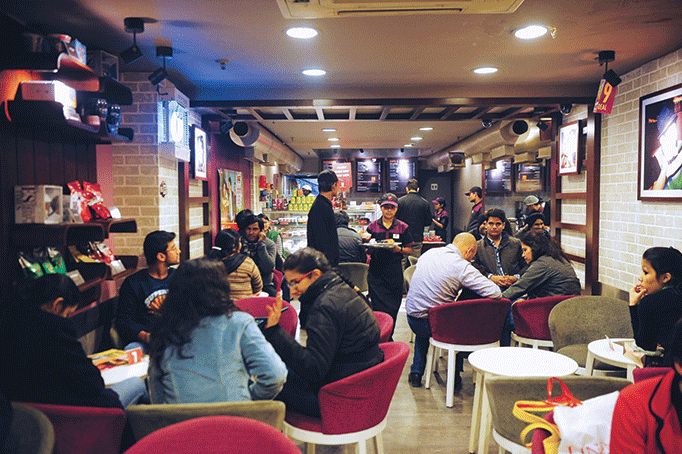
There is something of a coffee revolution brewing just now in India, a country that was traditionally the domain of tea lovers. In fact, so eagerly have Indians taken to sipping their java that one of the drivers of this revolution — Coffee Day Group, parent company of the Café Coffee Day chain — is planning an IPO within the next 12 months, according to published reports.
Until about the 1990s, popular coffee consumption in India was largely confined to the southern region; anywhere else in the country during that time, it was considered a novelty of the elite, consumed mainly in five-star coffee shops. Café Coffee Day was conceived as a less costly and more inviting alternative for the masses. Since its creation in 1996, the chain has grown to some 1,650 cafés, most of them across India, though some operate in Austria and the Czech Republic as well. The company says it anticipates having about 2,000 shops in operation by 2016.
The idea of an affordable café lounge occurred to the company’s chairman, V.G. Siddhartha (many in South India choose to use only their first initials), from his observations of the beer-serving Internet parlors in Southeast Asian countries. What was attracting young patrons to these parlors was not chiefly the beer, Siddhartha reasoned; it was the experience — an experience he concluded was easily replicated by holding onto the trendy Internet-activity ambience but substituting coffee for beer. Siddhartha, whose family owned coffee plantations in the South India state of Karnataka, set up the very first café at Brigade Road, in Bangalore, capital of Karnataka. “That was, as per our records, the first cyber café in the country,” said K. Ramakrishnan, Coffee Day Group’s president of marketing, in an email. “Later, as commercial Internet access became the norm and cyber cafés mushroomed, CCD decided to stick to the core business of coffee.” Today the shops emphasize a variety of coffee flavors and beans from around the world, plus sandwiches and desserts, much more than the Internet, he says.
“The primary reason for success has been a keen understanding of the Indian youngster at large,” said brand expert Harish Bijoor, CEO of an eponymous consulting firm that has no business relationship with CCD. “At every stage, the company has calibrated the mind of the consumer at large and has made offerings that are relevant, original and innovative.”
Such cafés are now ingrained in Indian culture. They have emerged as a place to socialize beyond the home, the school or the office, says Bijoor. “Cobbling together a local hangout that is global in form and delivery, and yet is not obscenely priced, is the success model of this chain,” he said. Most of the patrons range in age from late teens to early 30s, though roughly 10 percent are 40 or older. The chain’s slogan trumpets that “a lot can happen over coffee,” and the company seems intent on making its shops the places where it will. “If you were wearing your heart on your sleeve, as many youngsters do, you could as well fall in love at a CCD,” Bijoor said. “And many did — more than once!”
Here young customers find a setting where they can savor their independence safely and affordably, perhaps in contrast to some of the beer hangouts, says Bijoor. “A no-alcohol locale where parents could trust their children were hanging out without the ill effects of the alcoholic brew — to that extent CCD has emerged as a friendly and wholesome hangout place for the young and young-at-heart.”
The chain has been dominant in this market for some time, but others are moving in. Starbucks now operates about 50 shops across six Indian cities, and Costa Coffee has about 100, plus ambitions to boost that to 1,000 across the country by 2016. Café Coffee Day says it can still rely on its greater familiarity with the market, however. And the company seems to have a novel take on competitive dynamics, too. “The competition is not just another coffee brand, but anything that occupies mind space,” Ramakrishnan said. “Surely, new and existing brands will come and expand the market. But all the benchmarks in this business so far have been set by CCD in India.” The biggest threat is not competitors, but complacency, he says. “When you are competing for mind space, anything is competition: IPL [the Indian Premier League cricket tournament] is competition; a great movie is competition.”
If anything, the chain’s coffee rivals have served to promote “coffee evangelism,” says Bijoor. This is good for everyone in the trade, he asserts: the café chains, the coffee growers, the food suppliers, the furniture suppliers, the coffee-machine makers and the entire ecosystem of support.
“Coffee culture has not looked back in India since 1996,” he said, “and I hope it never does.”
